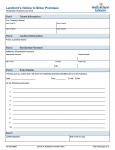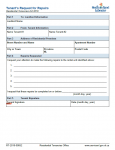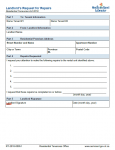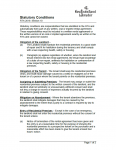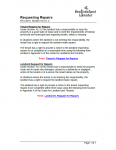Landlords are required by law to maintain their properties and make any necessary repairs within a reasonable amount of time. Failing to make necessary repairs could give the tenant a reason to terminate the rental agreement.
Tenants are responsible for repairing damage that they cause, or their guests cause, but are not responsible for things considered “normal wear and tear”.
If at any time the landlord and tenant come to an agreement for the tenant to complete necessary maintenance or repair work on the rental unit on behalf of the landlord, the tenant is entitled to be compensated at a reasonable rate for the work.
Formal Requests and Notice of Entry
A tenant is required to put any requests for repairs in writing unless it is an emergency. The notice should contain the tenant’s name and signature, the date, the address of the rental unit, the landlord’s name, and a description of the issues requiring attention. There is also a form you can use for this purpose in the “Files / Documents” section below.
Except in an emergency tenants must be given a written notice of entry at least twenty-four hours prior to the landlord entering the rental unit. This includes entry by contractors, such as electricians or plumbers, carrying out maintenance and repairs. The twenty-four-hour notice requirement can be waived if the tenant agrees to the entry. The tenant’s consent does not need to be in writing. There is more information on this in our Help Topic on Entry of Premises.
Failure to Report (Negligence)
Tenants should inform the landlord about any issues requiring maintenance or repairs as soon as possible. If a tenant fails to report an issue to a landlord, and their failure to report the issue allows further property damage to occur, the tenant could be liable for the damage that results.
For example, if a tenant is aware of a leaking pipe and fails to report it to the landlord in a timely manner, and as a result there is significant water damage, the tenant could be liable for those damages. It is for this reason that tenants should report any issues to their landlord as soon as they become aware of the problem.
Essentially any damage that is caused because the tenant failed to report a problem to the landlord is looked at the same as if the tenant caused the damages themselves.
Damage Caused by the Tenant or Guests
If a tenant, or their guests, cause damage to the rental unit the landlord may give the tenant a written notice stating that the damage must be repaired. If the tenant fails to comply within three days, or a longer period of time if reasonable in the circumstances, the landlord may serve a termination notice. A termination notice in this case can be for as little as five days. There is more information about this process in our Help Topic about Termination Notices. A tenant is obligated by law to keep the premises clean and repair any damage they cause. There is more information on this in our Help Topic about Tenant Obligations and Repairs and Maintenance.
Failure to Make Repairs
In cases where a landlord fails to make necessary repairs in a reasonable amount of time the tenant may make an application to pay their rent “in trust” to the Landlord and Tenant Division of Service NL. If approved, the tenant would pay their rent directly to Service NL. The landlord would be reimbursed once the required repairs were completed. A tenant cannot withhold rent from the landlord over issues of maintenance or repairs without first making an application to Service NL. There is more information on this in our Help Topic about Landlord Obligations and Repairs and Maintenance.
Emergency Repairs
In some cases when the landlord is unavailable a tenant may be forced to carry out emergency repairs. These would be situations where repairs are necessary as quickly as possible to prevent major property damage, eliminate serious hazards to health & safety, or to prevent the rental unit from becoming uninhabitable. The tenant should keep any receipts, documents, or photos that may be necessary to show the nature of the repairs and work that was performed.
In these cases, the tenant should make a written request to the landlord to be reimbursed the reasonable costs of completing the work. In the event of a disagreement between the landlord and tenant over whether the repairs were necessary, and the costs reasonable, the tenant may apply to Service NL and a hearing will be held to decide these matters. Depending on the circumstances a landlord could be ordered to pay money to the tenant, or the tenant may be authorized to withhold money from the rent.
Unfit for Habitation
If the landlord fails to maintain a rental unit in a condition that is fit for habitation, or something happens to cause a rental unit to become unfit for habitation, the tenant may give written notice that the rental agreement is terminated immediately.
If an action or inaction of the tenant causes a rental unit to become unfit for habitation the landlord may give written notice that the rental agreement is terminated immediately.


